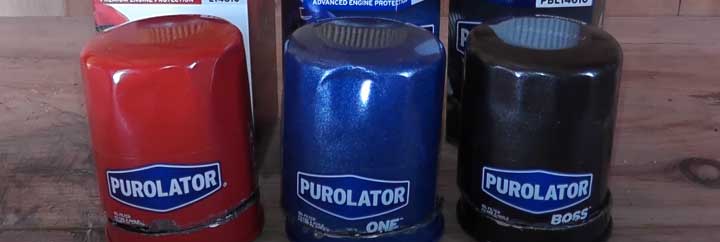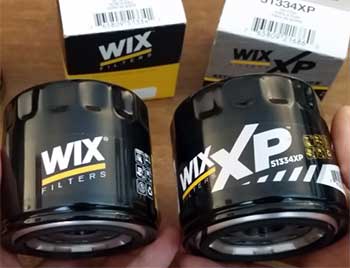Looking under the hood, the health of your vehicle largely depends on the quality of the oil filter. And the market has some serious players, but today, we’ll talk about two major brands: Purolator and WIX.
Both have built a solid reputation in the auto industry. But which one gives you the edge?
Let’s dive in!
A Brief Comparison Table
| Features | Purolator | WIX |
| Filtration Efficiency | 99%-99.9% | Varied based on model |
| Build Quality | Metal end-caps, silicone anti-drain back valve | Metal end-caps, silicone anti-drain back valve |
| Installation and Fit | Grippy texture for easy installation, Snug fit | Can be slippery, Excellent fit |
| Range of Options | PurolatorONE, PurolatorBOSS, Classic Purolator | Standard WIX, WIX XP, NAPA Gold |
| Price | Slightly higher | Comparable to Purolator |
Purolator Oil Filters: Standing Strong Since 1923

Purolator, boasting a history of nearly 100 years, has a varied range of oil filters to suit all vehicle types. The flagship products like PurolatorONE and PurolatorBOSS are synonymous with superior performance and durability.
Pros
- Time-Tested Performance: Purolator filters consistently offer impressive particulate removal and protection against harmful debris. Their robust designs can withstand demanding conditions, making them reliable companions for your engine.
- Wide Variety: Whether it’s a classic car or a modern SUV, Purolator has got you covered. The diverse product range ensures there’s an option for every driver out there.
- Innovative Technology: Purolator filters utilize proprietary synthetic blending in their filter media. It ensures a longer life and improved efficiency.
Cons
- Cost Factor: Purolator filters are relatively pricey. However, most users agree that their superior performance justifies the cost.
- Availability: Despite their extensive product line, finding a specific Purolator filter can sometimes be tricky.
Also Read: Differences Between Red Line And Royal Purple Motor Oils.
WIX Oil Filters: Redefining Quality Since 1939
WIX is another renowned name in the filter industry. With products like XP and NAPA Gold, WIX filters have carved a niche for their premium quality and performance.
Pros
- High Efficiency: WIX filters excel in removing contaminants. They provide optimal filtration without compromising the oil flow.
- Durability: WIX filters are made with robust materials that guarantee a long service life. The heavy-duty construction also makes them resistant to wear and tear.
- Ease of Installation: WIX oil filters are designed to be user-friendly. Installation is generally hassle-free, making them an excellent choice for do-it-yourselfers.
Cons
- Pricing: Much like Purolator, WIX filters come with a higher price tag. But most users agree, the superior quality is worth the extra bucks.
- Inconsistent Quality Across Range: Some users have noted a variance in quality across the WIX product range. This discrepancy may cause confusion when choosing the right filter.
Key Differences Between Purolator and WIX Oil Filters
When comparing Purolator and WIX, you’ll notice several differences that set these two brands apart. Let’s drill down and assess some of the critical areas.
- Filtration Efficiency

One of the most significant differentiators when comparing oil filters is filtration efficiency.
Both Purolator and WIX offer high-performance filters, but their proprietary technologies differ.
Purolator uses a synthetic blend media in its PurolatorBOSS filters, which provides 99% dirt removal power.
The PureONE filters, on the other hand, offer 99.9% removal of dirt and debris, which is an exceptional level of efficiency.
WIX filters use a wire-backed synthetic media in their XP range, providing superior protection. However, their traditional spin-on filters use a cellulose media, which isn’t as effective as synthetic blend media in capturing the smallest particles.
- Durability and Build Quality
Oil filters need to withstand high pressure, temperature changes, and corrosive materials. Therefore, build quality and durability are crucial factors to consider.
Purolator filters feature metal end-caps, which are more resistant to pressure changes compared to cardboard ones. PurolatorBOSS filters are equipped with a silicone anti-drain back valve which remains flexible in extreme temperatures, maintaining oil supply to the engine on start-up.
WIX filters also boast impressive build quality. The XP range uses metal end-caps and a center tube to enhance durability. Their silicone anti-drain back valve ensures a steady oil supply even under harsh conditions.
- Installation and Fit
The ease of installation and the quality of fit are vital when choosing an oil filter.
Purolator filters are designed for a snug fit, ensuring they don’t loosen over time. The grippy texture on the end of the filter makes installation and removal easier.
WIX also offers an excellent fit and the XP range features a high burst strength canister that resists deformation. However, some users have reported that the texture on the WIX filters isn’t as grippy as Purolator’s, making them a bit slippery to handle during installation.
- Range of Options
Purolator offers an extensive range of options designed to meet different needs. The PurolatorONE line is ideal for everyday driving, PurolatorBOSS is designed for synthetic oils and demanding conditions, and Classic Purolator caters to older vehicles.
WIX, on the other hand, offers three key ranges – the standard WIX, WIX XP, and NAPA Gold (made by WIX). Each serves a different segment of the market, but the choices aren’t as extensive as Purolator’s.
Also Read: Comparison of HP And K&N SO Oil Filters.
Frequently Asked Questions (FAQ)
Absolutely. Purolator filters consistently rank high in terms of efficiency, durability, and innovation. Their proprietary technology and wide product range make them a go-to option for many motorists.
The “best” brand depends on your specific needs. Both Purolator and WIX offer excellent filtration, durability, and performance. However, factors like vehicle type, driving conditions, and budget may sway your preference towards one over the other.
Purolator oil filters are made by the Purolator Filters NA LLC, a joint venture between Mann+Hummel GmbH and Bosch Auto Parts.
WIX filters aren’t necessarily “better” but they have certain features that some users prefer. They offer high efficiency, durability, and ease of installation. But like any product, the suitability largely depends on individual requirements and preferences.
Wrapping Up
Choosing between Purolator and WIX is like choosing between two power hitters. Both brands bring their A-game in terms of filtration efficiency, durability, and performance. It essentially boils down to your specific requirements, budget, and personal preference.
Don’t forget, regular oil filter changes are key to maintaining your vehicle’s health. Whether you pick Purolator or WIX, rest assured, your engine is in capable hands. So rev up your engines and let’s hit the road!

